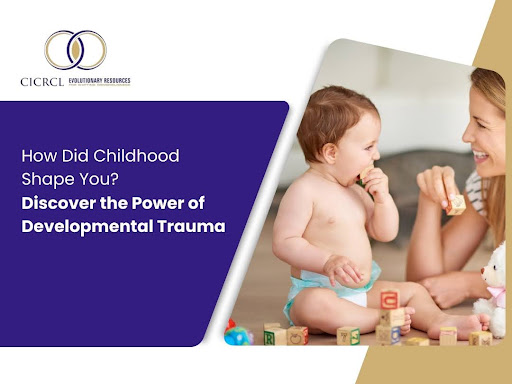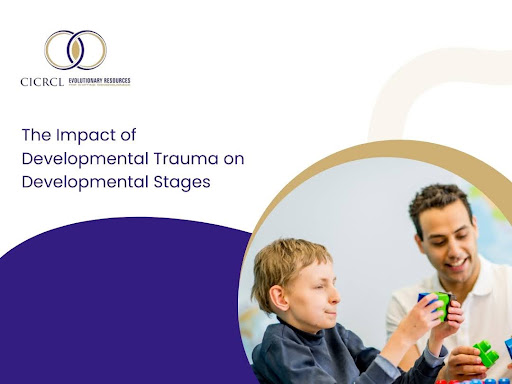Developmental trauma refers to the emotional, psychological, and neurological impacts of adverse experiences during critical periods of childhood development. These experiences can profoundly shape an individual’s perception of themselves, others, and the world around them. Developmental trauma healing is a complex journey that involves understanding its roots, recognizing its effects, and implementing strategies for recovery. In this comprehensive guide, we’ll explore the concept of developmental trauma, its effects on individuals across different developmental stages, and effective healing methods.

Understanding Developmental Trauma:
Developmental trauma occurs when children experience prolonged or repeated adverse experiences, such as abuse, neglect, or exposure to violence, during critical stages of their development. These experiences disrupt the normal course of development and can have lasting effects on various aspects of functioning, including emotional regulation, cognitive processing, and interpersonal relationships.
“Healing doesn’t mean the damage never existed.
It means the damage no longer controls our lives.”
Key Components of Developmental Trauma:
Early Onset:
Developmental trauma typically occurs during sensitive periods of brain development, such as infancy, childhood, and adolescence. Adverse experiences during these formative years can disrupt the formation of neural pathways and affect the development of essential skills, including emotional regulation, attachment, and social interaction.
Pervasiveness:
Developmental trauma often involves repeated or chronic exposure to adverse experiences, rather than isolated incidents. These experiences may occur within the family environment, such as neglect, abuse, or exposure to domestic violence, or in broader societal contexts, such as poverty, discrimination, or community violence.
Interpersonal Nature:
Development trauma frequently involves interpersonal relationships, where caregivers or other trusted individuals are the source of harm or neglect. This can lead to difficulties in forming secure attachments, trusting others, and establishing healthy boundaries in relationships.
Impact on Development:
Developmental trauma can disrupt multiple areas of development, including physical, emotional, cognitive, and social domains. It may manifest as developmental delays, emotional dysregulation, impaired social skills, academic difficulties, or behavioral problems.
Attachment Disruptions:
Secure attachment bonds between children and caregivers provide a foundation for healthy development and emotional well-being. Developmental trauma can disrupt these attachment relationships, leading to insecure attachment styles characterized by ambivalence, avoidance, or disorganization.
Dysregulation of Stress Response:
Exposure to chronic stress and trauma can dysregulate the body’s stress response systems, including the hypothalamic-pituitary-adrenal (HPA) axis and the autonomic nervous system. This can result in heightened arousal, hypervigilance, and difficulties in regulating emotions and physiological responses to stress.
Complexity and Variability: Developmental trauma is often complex and multifaceted, with individuals experiencing a range of adverse experiences and responses. Traumatic experiences may vary in severity, duration, and context, leading to diverse manifestations of trauma-related symptoms and coping mechanisms.
Long-Term Effects: Developmental trauma can have long-lasting effects that persist into adulthood, influencing various aspects of an individual’s life, including relationships, career, health, and overall well-being. Untreated trauma may increase the risk of mental health disorders, substance abuse, interpersonal difficulties, and physical health problems later in life.
Resilience and Recovery: Despite the challenges posed by developmental trauma, many individuals demonstrate resilience and adaptive coping strategies in the face of adversity. With appropriate support, intervention, and resources, individuals can overcome the effects of trauma and lead fulfilling lives.
Developmental Trauma healing
Developmental trauma healing requires a holistic and trauma-informed approach that addresses the underlying emotional wounds and supports individuals in building resilience and coping skills. Here are some strategies for self healing developmental trauma:
Therapeutic Interventions:
Therapies such as trauma-focused cognitive-behavioral therapy (TF-CBT), eye movement desensitization and reprocessing (EMDR), and play Individual therapy can help individuals process traumatic memories, regulate emotions, and develop healthier coping mechanisms. Therapists trained in trauma-informed care provide a safe and supportive environment for exploring difficult emotions and experiences.
Attachment-Based Interventions:
Building secure attachments is essential for healing trauma, as it provides a sense of safety and trust in relationships. Therapeutic interventions focused on enhancing attachment bonds between children and caregivers, such as dyadic therapy or parent-child interaction therapy (PCIT), can promote emotional resilience and interpersonal skills.
Mindfulness and Self-Care Practices:
Mindfulness practices, such as meditation, deep breathing, and yoga, can help individuals cultivate present-moment awareness and regulate their emotions. Engaging in self-care activities, such as exercise, hobbies, and spending time in nature, can also promote relaxation and stress reduction, enhancing overall well-being.
Supportive Relationships and Community Resources:
Building a supportive network of family, friends, and community resources is crucial for healing developmental trauma. Peer support groups, mentorship programs, and community organizations provide opportunities for connection, validation, and mutual understanding. Seeking support from trusted individuals and accessing resources such as counseling services, support hotlines, and crisis intervention can offer valuable assistance during difficult times.

The Impact of Developmental Trauma on Developmental Stages:
The impact of trauma varies depending on the developmental stage at which it occurs. Here’s a closer look at how trauma can affect individuals across different developmental stages:
Infancy and Early Childhood:
During infancy and early childhood, the brain is rapidly developing, forming crucial neural connections that lay the foundation for future emotional regulation, social interaction, and cognitive functioning. Developmental trauma during this stage can interfere with these processes, leading to difficulties in forming secure attachments, self-regulating emotions, and trusting others.
Middle Childhood:
In middle childhood, children begin to develop a sense of identity, autonomy, and competence. Developmental trauma can hinder this process, resulting in low self-esteem, behavioral problems, and difficulties in school and peer relationships. Children may exhibit symptoms of anxiety, depression, or post-traumatic stress disorder (PTSD) in response to traumatic experiences.
Adolescence:
Adolescence is a period of significant physical, cognitive, and psychosocial changes. Developmental trauma during adolescence can exacerbate identity struggles, increase risk-taking behaviors, and contribute to the onset of mental health disorders such as substance abuse, eating disorders, and suicidal ideation. Trauma can also impact brain development, particularly regions involved in decision-making and impulse control.
Introducing the transformative guide you’ve been waiting for
“Breaking Free: Identifying and Changing Your Addictive Family Patterns”
Are you tired of feeling weighed down by the invisible chains of developmental trauma? Do you find yourself grappling with the echoes of past experiences that continue to shape your present reality? If so, “Breaking Free: Identifying and Changing Your Addictive Family Patterns” is the book you’ve been searching for.
“Breaking Free,” draws upon years of expertise and personal experience to provide insights, strategies. And practical tools for reclaiming your power and autonomy. Through compelling stories, insightful analysis, and actionable advice. You’ll uncover the root causes of your addictive family patterns and learn how to cultivate healthier relationships, set boundaries, and embrace your authentic self.
Why should you buy “Breaking Free”? Because it’s not just a book – it’s a lifeline. Whether you’re struggling with substance abuse, codependency, or other addictive behaviors, this book offers hope and healing. It empowers you to break free from the chains of the past. And create a brighter future filled with purpose, joy, and fulfillment.
Don’t let another day pass you by. Take the first step towards liberation. And order your copy of “Breaking Free: Identifying and Changing Your Addictive Family Patterns” today. Your journey to freedom starts now!
Ready to break free from addictive family patterns? Order your copy of “Breaking Free” now and embark on the path to healing and transformation!
Conclusion:
Developmental trauma has profound and far-reaching effects on individuals’ lives, influencing their thoughts, feelings, behaviors, and relationships. However, healing from developmental trauma is possible with the right support, resources, and interventions. By understanding the roots and impacts of developmental trauma. And implementing effective healing strategies, individuals can reclaim their sense of agency, resilience, and well-being. Remember, healing is a journey, and it’s never too late to begin.
